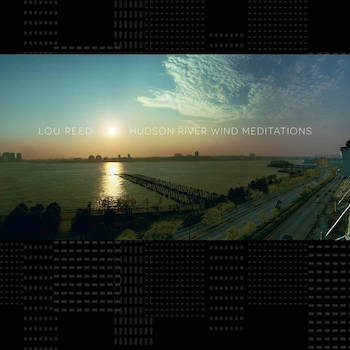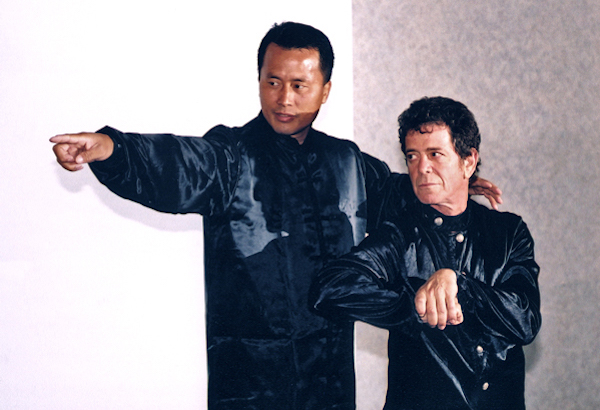Album Review: Lou Reed’s “Hudson River Wind Meditations” — Meditative Loop-De-Loops
By Steve Erickson
It may not be one of ambient music’s masterworks, but this 2007 album deserved far better treatment than utter neglect from Lou Reed fans.
Lou Reed Hudson River Wind Meditations (Light in the Attic)

Lou Reed’s solo career was full of maneuvers that baffled his fans, whether they be the slick pop of Sally Can’t Dance or the grating prog-metal of his collaboration with Metallica, Lulu. Metal Machine Music, his 1975 double album of feedback and white noise, epitomized this. More than one critic has pointed to Hudson River Wind Meditations, his final solo album, as its mirror image. On its release in 2007, the record sank like a stone. (The following year, Reed formed the free improv group Metal Machine Trio.) The celebrated musician couldn’t even get a conventional release for Hudson River Wind Meditations. After he put out a string of solo albums on Sire, Hudson River Wind Meditations came out on Sounds True, a label which specialized in audiobooks. An album of half-hour drones, created for use in Reed’s own yoga practice, was the last thing anyone expected from him at that point. Now that Light in the Attic has reissued the record as part of its archival Reed series, it’s likely to find its widest audience.
By 2007 the field of ambient music was thriving, and Reed was unlikely to be the first artist anyone looked at for it. The structure of Hudson River Wind Meditations, which co-producer Hal Wilner helped shape into album form — through Ableton Live, a digital audio workstation for macOS and Windows, suggests American composer William Basinski. (The music was originally composed as a bed for spoken instructions by Reed’s Tai Chi instructor, Master Ren GwengYu.) Minimal and repetitive, its sounds loop up and down, volume rising and falling with the regularity of deep inhalation and exhalation. “Move Your Heart” focuses on a motif of decay: the composition was constructed from a sample of the wind. “Find Your Note” is more dissonant, featuring a trebly piercing noise at its center. Dynamics change infinitesimally, even if everything (apparently) remains quiet. (At a certain point, one wonders if slight differences in the loops are audio illusions.) The recording imperfections are audible in the fuzz that runs through the loudest peaks of “Move Your Heart.” (“Wind Coda” is a much shorter loop of the sample, ending with a gong.) There’s nothing approaching a melody here, just textures with very small variations.

Lou Reed and Master Ren GwengYu. Photo: KungFuMagazine.com
Hudson River Wind Meditations comes across as a late-in-life attempt to find peace. It also exudes a lack of ego, with Reed leaving his voice, guitar, and songwriting out of the picture. The album suggests a person trying to escape from his persona, throwing off the shackles of the New York lowlife characters he had created. “Find Your Note” takes a shard of feedback which could’ve been sampled from Metal Machine Music or White Light/White Heat and makes an entire 31 minute track with it. The title’s connection to water makes great sense: this music ebbs and flows slowly and gently.
Some of Hudson River Wind Meditations’ unusual nature comes from the fact that it was not originally intended for public release. Reed made it for himself, Laurie Anderson, and Master Ren. The spoken guides to meditation that were on the soundtrack are missing from the entirely instrumental album. Still, it is structured as the basis for a lengthy session of yoga, down to the reprise of “Move Your Heart” in much shorter form.
The modesty of Hudson River Wind Meditations is what makes it disarming. It may not be one of ambient music’s masterworks, but the album deserved far better treatment than utter neglect from Reed fans. The incorporation of traces of noise into its spiritual quest gives the record some edge – despite the New Age trappings, urban life pushes its way into the foreground. If Basinski’s The Disintegration Loops was a response to 9/11, Hudson River Wind Meditations continues to listen for solace, not just in nature but in the heart of Manhattan, 16 years later.
Steve Erickson writes about film and music for Gay City News, Slant Magazine, the Nashville Scene, Trouser Press, and other outlets. He also produces electronic music under the tag callinamagician. His latest album, The Bloodshot Eye of Horus, was released in November 2022, and is available to stream here.

“…it is structured for a lengthy session of yoga…” That’s not the discipline Reed and Master Ren practiced. That’s an awful lot of words from someone who doesn’t respect the source material enough to get the practice Reed dedicated much of his later life to.